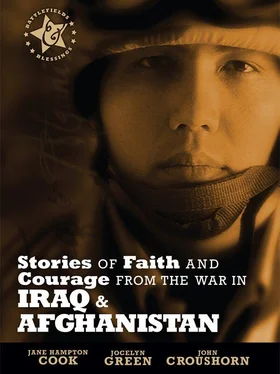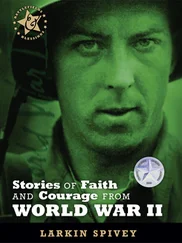“Ah, the helicopter fly-over was for him.”
“Yes Ma’am.”
“What can we do for you?”
“Bring us home, Ma’am. Please, bring us all the way home.”
We stand together in silence for a long time, two total strangers connected by the intimacy of honor. His countenance is beautiful. In spite of his grief, in spite of the horror he has seen he is beautiful. As soon as he leaves, I regret not getting his name. I wish I’d been able to listen to his story. I wished I’d prayed with him. I wish I’d prayed for his healing. I also wish I had told him how proud I am of him and the many sacrifices he’s made for my freedom. How I wish I had told him… but I didn’t.
Several minutes later, I pick up the piece of metal he left on top of his friend’s gravestone. It’s a dog tag. It has an American flag on one side and the words to Joshua 1:9 on the other side.
Prayer:
Thank you, Lord, that this soldier has confronted terrorism first-hand so that I never have to. Bring rest to his spirit, Lord, and remove any terror that has taken up residence in his heart.
“Have I not commanded you? Be strong and courageous. Do not be terrified; do not be discouraged, for the LORD your God will be with you wherever you go.” (Joshua 1:9)
June 6
THE SMALLEST PATIENT
Colonel Jay A. Johannigman, Deputy Commander of the 332nd U.S. Air Force EMEDS (Expeditionary Medical Support), Iraq, 2003
All right, what do we have here? I wondered as I opened the back doors of the Red Crescent (Iraqi) ambulance. It was a nine-year-old Iraqi boy who had been wounded almost nine days earlier by unwittingly picking up an anti-personnel device. Iraqi surgeons did the best they could for Saleh, but told his father to prepare for his death. The boy’s father bribed a friend who was a Red Crescent ambulance driver to drive his son to our base for another chance.
Once inside the hospital, we were horrified to see that his abdominal wall had been completely blown away, exposing the intestinal tract. His right arm which he had lost in the initial blast had not been treated in nine days; it had been bandaged once and it was covered in blood and pus from his draining wounds. The portion of his remaining left hand was mangled almost beyond recognition.
The Air Force medics and I operated on him nine hours that first day. God show me the way, was whispering in my head over and over. By the grace of God, he began to stabilize.
As a military medical corps, we were not designed to care for pediatric patients, but we arranged for some materials from our army brethren in Baghdad. Every day I emailed a pediatric surgeon friend for advice, and she arranged for a company in Britain to overnight express us all the equipment necessary to do what’s called a wound vac.
This boy, Saleh, had just one hand left that was salvageable.
“If we take this other hand what kind of a life would he have left?” the orthopedic surgeon mused.
“Tell you what, Eric,” I replied. “If I can figure out a way to keep his belly together, you figure out some way to keep that left hand on him.” So that was a pledge. Eric had never reconstructed a hand, but he got on the Internet and started working and pinning and cleaning. Every time we were back there cleaning Saleh’s belly, he was back there doing something he’d never been trained to do, but somehow this all worked out. We prayed a lot. One nice thing about a deployed base the chapel is always open and the lights are on.
Prayer:
Lord, give me the courage to overcome obstacles to achieve the things you want me to.
“If you believe, you will receive whatever you ask for in prayer.” (Matthew 21:22)

Saleh on the day of his arrival
June 7
MODERN MEDICINE OR THE HAND OF GOD?
Colonel. Jay A. Johannigman, Deputy Commander of the 332nd U.S. Air Force EMEDS (Expeditionary Medical Support), Iraq, 2003
Two chaplains in particular prayed with us every day (Chappy Erikson and Thiesen), for which I was so grateful. As a deployed doc, the hospital is your chapel and God is everywhere with us. The chaplains were truly amazing they helped get patients off the helicopter, ran blood back and forth, lifted patients onto the ambulance, said prayers at the sides of those soldiers we don’t send back home. They were in the ICU as much for us as for our patients. And they certainly lifted us up as we worked on Saleh. They even held special prayer services for him.
It was amazing to see how the base was transformed with Saleh’s arrival. We saw our soldiers, airmen, cooks, Security Forces, and our commanders come through and just lift the flap on the ICU tent to make sure Saleh was still there.
Throughout Saleh’s stay with us, the entire hospital took care of that boy as we would our own son. But on his fifth post-operative day, Saleh was bleeding to death from his stomach. I had run out of medical options and I asked nurses to find the Chappy fast.
“Chappy Erikson, I have nothing left I can do.” I said. “I’ve done all I can, I’m going to lose this kid. Will you come over and say a prayer?”
And Chappy did. He laid hands on this young man and lifted him up in prayer while Saleh was screaming and crying in Arabic, and his father was saying his prayers as a devout Muslim. All of us medics were standing there watching, crying and when that happened that young man stopped bleeding. Was it medicine or God’s hand? I know what it was. There was no more medicine to offer him. God spared his life that day.
Prayer:
Lord, let me never dismiss the power of praying with other believers.
“For where two or three come together in my name, there am I with them.” (Matthew 18:20)

A USAF nurse caring for Saleh—the intensity needs no explanation
June 8
JUST ONE SHOT
Colonel Jay A. Johannigman, Deputy Commander of the 332nd U.S. Air Force EMEDS (Expeditionary Medical Support), Iraq (2003)
“Saleh had done remarkably well under our care, but for a full recovery, this young man only had one shot, and that was to get him to the United States. Just as it is now, it was extremely controversial to do that to take an Iraqi child, because “if you take one you have to take them all.” I understand the politics of all that, but I was early in my experience. I told the boss that this young kid had to go to the United States.
If I had known then what I know now about how hard that was to accomplish, I would have given up a long time ago. But we didn’t. We worked some back channels and were given some miracles. We got Saleh cleared to get on a C-130. The same anesthesiologist who was my first assistant was going to rotate home to California at the same time, and we found a pediatric hospital in Oakland who was willing to take care of him. So the anesthesiologist flew with this young man thirty-six hours all on Air Force aircraft.
Six-months later, my young friend Saleh was discharged from Oakland’s Children’s Hospital. They gave him all the care in the world without a penny being charged to him. I have a picture of Saleh and his cell phone. I know it works because I’m on his speed dial. And he will call me up. That was three years ago.
Today, he lives in Oakland, California. He has been mainstreamed, is in the sixth grade of a public school. He goes to school every day and his dad works in the hospital that has cared for him. They are both very grateful for what God has given them. This kid has got a resilient spirit that you would not believe.
Читать дальше














